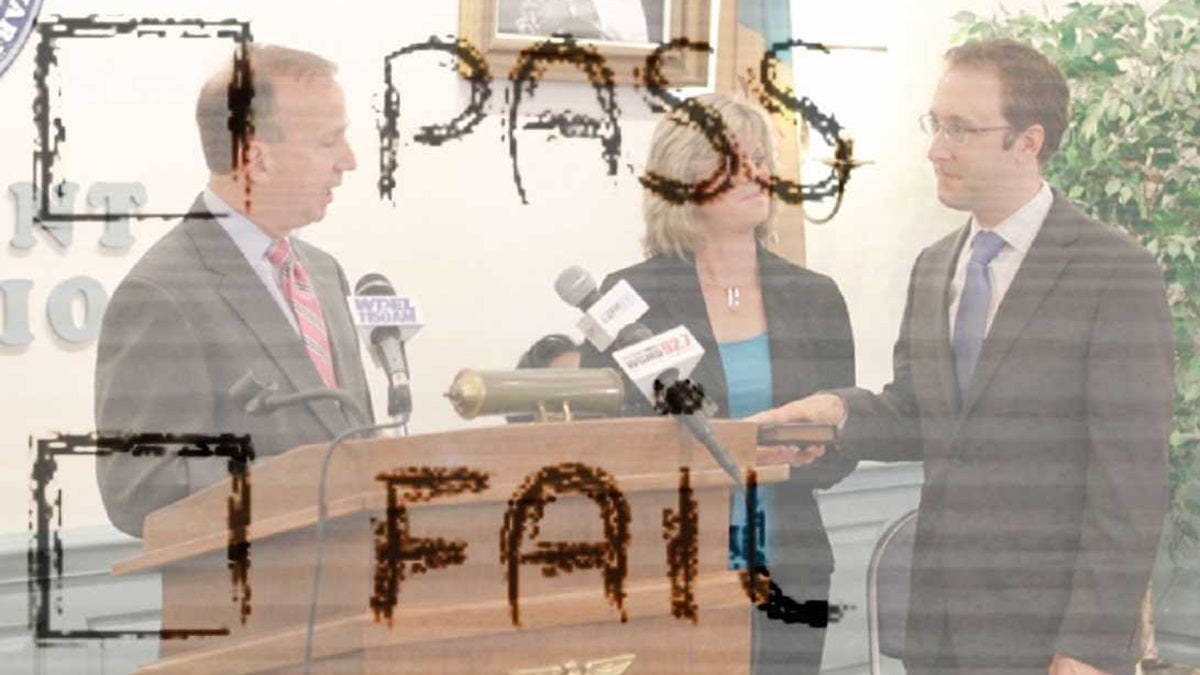A closer look at the “success” of Mark Murphy under Governor Markell
 Pass fail photo via ShutterStock) " title="pass-fail-169" width="1" height="1"/>
Pass fail photo via ShutterStock) " title="pass-fail-169" width="1" height="1"/>
Mark Murphy is sworn in as Secretary of Education, June 1, 2012. (courtesy of news.delaware.gov, Pass fail photo via ShutterStock)
The announcement began with a sterling list of accomplishments: “a term marked by record-high graduation rates, more students enrolling in college, and better opportunities than ever for Delaware students to successfully prepare for the workplace.”
Surely, the person responsible for such achievements was due for a promotion.
Instead, not only was the applause muted, but the reaction to the departure of Mark Murphy as Delaware’s secretary of education was more like “be careful not to be hit by the door on your way out.”
Consider this observation from Mike Matthews, president of the Red Clay Education Association, posted on his Facebook page shortly after Murphy’s resignation was made public Friday: “But this is something that has needed to happen for a very long time. Operating at the height of arrogance and intransigence, what we got from 3+ years under Sec. Murphy’s leadership was an unwillingness to listen and understand.”
Indeed, if Gov. Jack Markell was truly impressed with Murphy’s accomplishments and his leadership, he would have begged him to stay another 16 months, to finish out the governor’s term and add a few more stellar bullet points to his resume.
But, as Markell surely knows, even if he does not admit it publicly, his carefully burnished image as an education reformer has been tarnished over the past year, in part through his own miscalculations and in part through the missteps of Murphy and his staff at the Department of Education.
To salvage any of it, Murphy would have to go. It mattered little whether he would be pushed out or leave on his own.
What went wrong?
Remember Markell’s “priority schools” announcement on the steps of Warner Elementary School last September?
Remember how that optimistic promise to reform six under-performing schools in Wilmington became bogged down in the muck of a one-sided “memorandum of understanding” magically prepared by Murphy’s staff in the following three weeks?
Remember how the MOU was delivered to the Red Clay and Christina school boards with a “take it or leave it” ultimatum that devolved into a six-month battle with Red Clay deciding to take it and Christina doing all it could to leave it behind?
Then came Smarter Balanced, the latest iteration in the education “reformers” drive to use examinations ostensibly designed to assess and improve student performance to help determine the competence of the teachers and principals responsible for educating those students.
First, Markell and Murphy let it be known that scores under Smarter Balanced would be lower because the test was harder than the one that preceded it.
And now, in late August, the public still hasn’t seen the results of the first Smarter Balanced tests, leading some to reasonably ask, “If we don’t have last year’s scores yet, how can we use them to help improve the education we give our students this year?”
The inability of Markell and Murphy to answer such questions this spring gave rise to the “opt out” movement and the approval of legislation, subsequently vetoed by the governor, which would have codified the right of parents and guardians to opt out their children from the Smarter Balanced assessment.
For all the posturing by partisans on both sides of the debate, the real issue here is not whether there’s too much of this standardized testing (most agree that there is), but why each of the tests is being given.
And don’t forget that the Delaware State Education Association, which jumped on board with Markell’s successful bid for federal Race to the Top funding six years ago, passed a “no confidence” resolution on Murphy this spring.
Bottom line: for whatever measurable achievements Murphy might have (and, in this data-driven administration, they’ve got the numbers to back up the claims), many of the interpersonal relationships that are essential to successful educational collaborations have been significantly frayed.
What’s next?
Markell, far more than Murphy, deserves credit for one achievement on the education front this year – passage of legislation designed to restructure the incredibly fragmented school systems within the city of Wilmington.
But much hard work remains for that to become reality, first a reorganization plan and then, more importantly, a new financing system that takes into account the needs of low-income, less-prepared students not only in Wilmington but also in other pockets of poverty throughout the state.
To step into the breach, Markell intends to nominate Steven Godowsky, the well-respected former superintendent of the New Castle County Vo-Tech School District. Godowsky has devoted more than 40 years to Delaware education, as a teacher, principal and superintendent. With his knowledge of the players at the district level, Godowsky may be able to rebuild the state-local relationships that deteriorated under Murphy’s watch.
But Markell’s term ends in January 2017, and in all probability Godowsky will depart with him, so the new secretary cannot be considered the long-term solution.
As for the short term, don’t expect Godowsky to change the course Markell and Murphy have charted. He’s not a free agent; he’s the governor’s appointee.
The policies and objectives might not change, but if Godowsky can communicate more clearly and more credibly than his predecessor – to the education community, the General Assembly and to the public at large – the chances for successful school reform in Wilmington increase, and so do the odds for other improvements statewide.
Writer-editor Larry Nagengast began reporting on Delaware education issues in 1972. You can email him: larry@wordsworkforyou.com .
WHYY is your source for fact-based, in-depth journalism and information. As a nonprofit organization, we rely on financial support from readers like you. Please give today.

